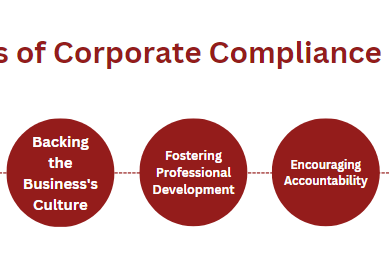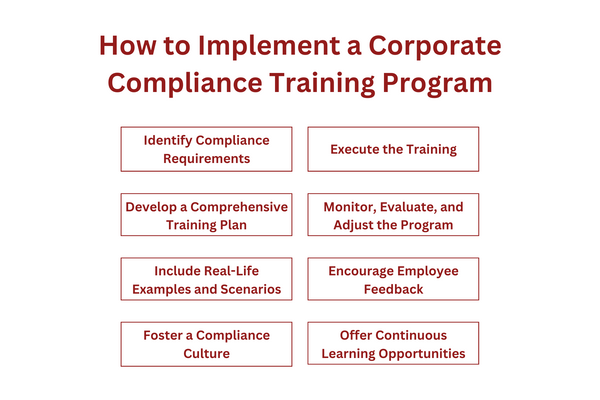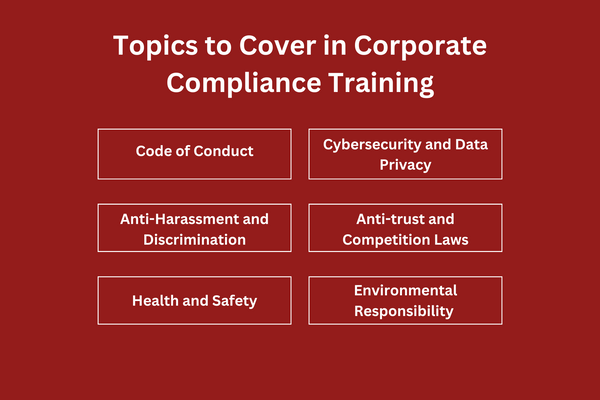
Navigating the ever-evolving business landscape demands more than business acumen. Establishing an ethical, responsible corporate culture is equally important. An essential tool for fostering this culture is corporate compliance training.
This training not only aids in regulatory adherence but also cultivates an environment of mutual respect and safety.
In this article, we’ll cover what corporate compliance training is and highlight the topics a comprehensive compliance training program should include.
Let’s dive in.
What is Corporate Compliance Training?

Corporate compliance training is an essential part of a business’s strategic approach to minimizing legal risks and fostering a positive work environment. Generally administered by a compliance officer, it equips employees with knowledge of the regulations, laws, and internal policies that directly impact their work.
The primary goal of this training is to ensure that a business operates within the legal and ethical boundaries set by both external regulatory bodies and internal policies.
It helps build a culture of compliance, where employees are not just conscious of their obligations but are actively participating in maintaining them.
By conducting corporate compliance training, businesses can preemptively address potential issues, mitigate risks, and safeguard their reputation. It actively demonstrates a business’s commitment to lawful and ethical conduct, which can significantly boost consumer trust.
Benefits of Corporate Compliance Training

Integrating a corporate compliance training program into your business structure can yield significant benefits.
It not only ensures that everyone has the information needed to perform their roles efficiently but also cultivates an environment conducive to physical and psychological well-being.
Here are some vital advantages your business can enjoy by investing in corporate compliance training:
Staying Ahead in a Rapidly Changing Business Environment
Given the volatile and ever-evolving business world, effective corporate compliance training becomes a necessary tool. It helps businesses stay updated and adhere to compliance standards in the face of these drastic changes.
Reinforcing the Business’s Culture
Training programs can enhance the understanding and reinforcement of your business values. It helps employees feel more connected, motivated, and aligned with the business’s mission.
Fostering Professional Development
The integration of compliance training into ongoing education programs enhances employees’ professional growth. It keeps the training material engaging and relevant, decreasing the likelihood of turnover.
Encouraging Accountability
When all departments and levels within the business share the same compliance responsibilities, it promotes a culture of trust and cooperation. Shared accountability improves productivity and encourages a healthy corporate environment.
Educating About the Consequences of Non-compliance
Making employees aware of the potential costs and damages of compliance violations can underscore the importance of adherence to corporate regulations. It adds a sense of relevance to the compliance training program.
How to Implement a Corporate Compliance Training Program

Establishing effective corporate compliance training solutions is a critical aspect of running a successful business.
This involves careful planning, strategic development, and consistent execution. It also involves understanding a compliance framework that serves as the foundation for all your compliance efforts.
Here are the essential steps your business should consider in implementing a corporate compliance training program:
Identify Compliance Requirements
Understanding the legal and ethical requirements specific to your industry is the first step. You can use compliance frameworks to guide you through these requirements.
The compliance officer should be well-versed with these requirements to effectively guide the training.
Develop a Comprehensive Training Plan
The employee training plan should be comprehensive and easy to understand. It should outline the key areas of focus, the mode of training, the timeline, and the metrics for success.
Include Real-Life Examples and Scenarios
Using practical examples and case studies can help employees understand the importance of compliance and the consequences of non-compliance. These examples provide a practical and engaging learning experience.
Execute the Training
Use interactive and engaging methods to execute the training. You can use visuals to enhance the understanding of the trainings. Make sure the training is consistent and recurrent to reinforce the lessons.
Monitor, Evaluate, and Adjust the Program using Data and Analytics
Monitoring the effectiveness of your corporate compliance training program is a critical step. Regular evaluation using data and analytics can provide useful insights into the program’s performance.
Moreover, gathering feedback from employees allows for a more nuanced understanding of the program’s strengths and areas for improvement. Based on these insights and feedback, adjust and update the training program regularly to ensure it remains relevant, engaging, and effective.
Encourage Employee Feedback
Creating a platform for employees to provide feedback about the training program can prove invaluable. Their insights and experiences can help fine-tune the program to better suit their learning styles and needs.
Foster a Compliance Culture
Embedding the importance of compliance into your business’s culture can enhance the effectiveness of your training program. It fosters a shared responsibility and commitment to adhere to the business’s compliance guidelines.
Offer Continuous Learning Opportunities
Compliance training should not be a one-time event. Offering continuous learning opportunities, like webinars, workshops, and corporate compliance training courses, can ensure employees stay updated on the latest compliance requirements.
Topics to Cover in Corporate Compliance Training

The subjects included in a corporate compliance training program should address the distinctive challenges and risks that are important to your business’s industry. Covering a broad spectrum of topics ensures a holistic approach to compliance.
Here are some essential areas to consider:
Code of Conduct
The business’s code of conduct is the cornerstone of the compliance training program. It offers employees a comprehensive understanding of what is expected from them in terms of behavior, ethics, and professional integrity.
This component guides employees to align their actions with the business’s values and principles.
Anti-Harassment and Discrimination
The inclusion of training on anti-harassment and discrimination laws is crucial in cultivating a respectful, safe, and inclusive work environment.
This training should address various forms of harassment and discrimination, teach employees to recognize these behaviors, and inform them about the procedures for reporting such incidents.
Health and Safety
Health and safety regulations are pivotal to any training program. Knowledge of these rules ensures employees understand their rights and responsibilities, promoting a safer, healthier work environment.
This topic may cover areas like occupational hazards, emergency procedures, and well-being practices.
Cybersecurity and Data Privacy
In our digital era, cybersecurity and data privacy have become paramount. Training in these areas should cover topics like phishing, password management, secure use of business devices, and data handling procedures.
This will enhance your business’s security and protect sensitive data.
Anti-trust and Competition Laws
Educating employees on anti-trust and competition laws is key to maintaining fair business practices and avoiding potential legal issues. This topic helps the business maintain healthy competition and fosters an understanding of the importance of market integrity.
Environmental Responsibility and Sustainability
Training on environmental laws and corporate sustainability can drive businesses to make a positive environmental impact.
Covering topics like waste management, energy efficiency, and sustainable sourcing encourages employees to participate in eco-friendly initiatives and understand their role in meeting regulatory standards.
FAQs
Why is Corporate Compliance Training Important?
Corporate compliance training helps businesses maintain legal and ethical standards, protect their reputation, and increase consumer trust.
How Often Should Corporate Compliance Training be Conducted?
This depends on the nature of the business and the regulatory environment it operates in. However, regular and recurrent training every year is generally recommended.
Who Should Undergo Corporate Compliance Training?
Every employee in the business, from the executives to the junior staff, should undergo corporate compliance training.
How Can Businesses Ensure Effective Corporate Compliance Training?
The effectiveness of training can be enhanced by using interactive methods, consistently updating the content, and gathering feedback from the employees for improvement.
Closing
In the modern business environment, the importance of corporate compliance training cannot be overstated. It is a significant investment that goes a long way in upholding a business’s reputation, boosting consumer trust, and ensuring long-term success.
As your dedicated partner, Captain Compliance is committed to helping you navigate the compliance landscape and helping your business with all your compliance needs.